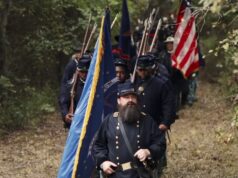

Should Oklahoma City Public Schools change the names of four low-performing elementary schools named after men who fought with the Confederacy during the Civil War?
That’s the question OKCPS Superintendent Aurora Lora will be asking the district board at its Sept. 5 meeting. If approved, the district would ask the community whether the school names should be changed in the wake of national discussions about white nationalism and Confederate symbols.
“What we want to do is find out if the communities have interest in going forward with a name change,” Lora said this afternoon at a press conference. “We believe it would [cost] about $50,000 each, but we’re actually going out to the schools, looking at how much signage there is, and if the signage is minimal, we think it could cost a little bit less.”
The schools in question are:
- Lee Elementary (424 S.W. 29th St.)
- Stand Watie Elementary (3517 S. Linn Ave.)
- Wheeler Elementary (501 S.E. 25th Street)
- Jackson Enterprise Elementary (2601 S. Villa Ave.)
On the state’s school report card rating system, Lee and Stand Watie have received “F” ratings each of the past three years. Wheeler has received an “F” the past two years. Jackson has received a “D” the past two years, up from “F” marks when it was a middle school the two years before that.
“We’re not trying to erase history,” Lora said of the schools’ names. “We still want history to be taught at our schools, but we want people to think about the people our buildings are named after and whether they represent the values that we as a district have at this time.”
On the state’s 2016 performance index, Jackson Elementary received a 65 for social studies scores. Stand Watie received a 39, Lee received a 43 and Wheeler received a 45 in the category that includes history.
Asked at the press conference what steps the district was taking to improve academic outcomes at the schools in question, Lora said that is “a separate issue.”
“We’re doing a lot of things in Oklahoma City Public Schools to improve the quality of education for all students. What you’re really going to see is the implementation of new state standards, new assessments,” she said. “We’ve rolled out different curriculum materials, and we are also implementing a Summit Learning Program, which is sort of a personalized learning program that I think we’re going to see some tremendous results out of, and some of those schools are some of the ones that are piloting this program.
“We are doing separate things in really trying to improve the quality of education, but this is something we’ve heard is important to some community members, so we also want to take an opportunity to at least hear their thoughts.”
Lora said she had heard from community members who found the school names “offensive,” though she said she had not heard any parent say the names are negatively affecting their children.
“We are hearing from families and people that they do find it offensive. Others are saying they don’t and that it’s just part of history,” Lora said. “Personally, I believe that we need to make sure our families and our students feel safe and appreciated when they come to our school every day. I think diversity is what makes our school district really special, and I want to make sure every student feels valued. If school names are something that are not helping kids feel valued, then I would support changing those.”
‘An excellent learning opportunity’
Discussions about the four schools’ names sprang up on social media after the weekend violence in Charlottesville, Virginia, where the town was planning to remove a statue of Robert E. Lee, general of the Confederate Army of Northern Virginia during the Civil War.
Amid national turmoil and controversial comments from President Donald Trump, statues of Lee and fellow Confederate General Stonewall Jackson were removed overnight in Baltimore.
Wheeler Elementary is said to have been named after Joseph Wheeler, who served as a general in both the Confederate Army and the U.S. Army, the latter during the Spanish-American War and the Philippine-American War.
Stand Watie Elementary is named for Stand Watie, who served as Principal Chief of the Cherokee Nation from 1862-1866. Watie’s influence on Cherokee political affairs spanned four decades. He was one of the primary signatories of the Treaty of New Echota, which ceded Cherokee land in northern Georgia to the United States in exchange for land in what is now eastern Oklahoma. That treaty was not signed by Principal Chief John Ross. Watie, Ross and others disagreed about how best the Cherokee Nation should position itself during the Civil War. Watie commanded Cherokee forces on behalf of the Confederacy, and he was the final Confederate General to surrender in 1865.
“I think this is an excellent learning opportunity where kids will become interested in learning more that the leaders their schools are named after,” Lora said. “It just underscores the importance that all subjects are being taught in school and that we’re not just focusing on state tests.”
Lora emphasized the importance of hearing from community members before deciding whether to change the school names, which would likely result in raising private funds for signage and other resource updates.
Lora said she had not spoken to the Cherokee Nation about the name of Stand Watie Elementary School, but she said she would like to hear from tribal representatives on the matter.




















